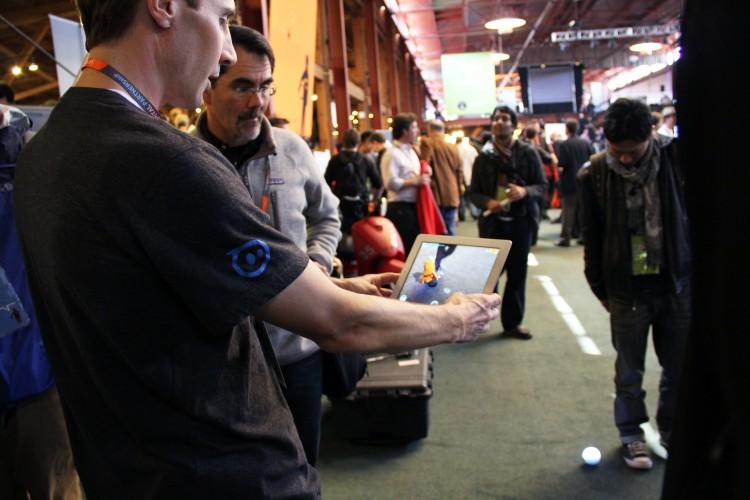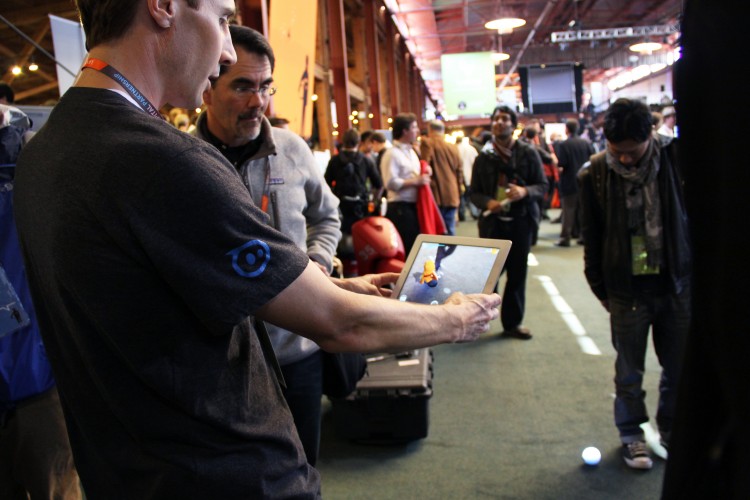SAN FRANCISCO—Ales Spetic has a little gray cube in his cellar. He has one in his kitchen, his living room, bedroom, and the various rooms of his office.
“We spend 90 percent of our lives indoors and we know nothing about it,” says Spetic, CEO of CubeSensors, the sensor-packed cubes that measure air quality, temperature, humidity, barometric pressure, noise levels, and light in a room. The information is sent to your phone, accompanied by adjustment suggestions on how to improve your indoor conditions—such as a humidity alert asking the user to make adjustments two months before mold would otherwise start growing in, say, a cellar.
None of these are particularly groundbreaking measurements, and the fact that the data is accessible through a mobile app was expected, but having it all neatly packaged into a little cube had the five thousand audience members craning to see—and over half raised their hand when asked if they'd want one—as the device was presented on stage at the sixth annual Launch Festival.
As festival attendees made their way through the tables on the main floor, crowds constantly gathered at the various robotics demonstrations.
“If you’re the type of person who thinks robots are neat, you usually don’t grow out of that,” said William Ronco of Orbotix. “You think robots are neat your whole life.”
Proof of that, Ronco says, is Orbotix’s product Sphero, a tiny robot trapped inside a durable ball. They’ve had overwhelming response from users of all ages since its launch a little over a year ago, and Sphero is now in 3,000 retail locations.
“That’s really the beauty of it—it’s a ball. It’s the simplest thing in the entire world,” Ronco said. Developers as well as consumers are attracted to the physicality of the object, and many have developed augmented-reality games where you control the ball on a physical surface with a mobile device, and watch it on screen as an animated character.
A tangible object has a different kind of appeal than software that runs, for example, in the background of your phone—it’s almost novel for the average consumer, and startups aren’t seeing that big of a divide in making the choice between creating software and hardware.
Hardware is getting increasingly easier to manufacture, even at a consumer level. 3D printer prices cost around $1,000 or less on the low end, and even EEG headsets (electroencephalography) provide mind-reading sensors to the average consumer for less than $200.
Yossi Vardi, one of the judges at the festival, is an entrepreneur who has founded and helped build over 60 high-tech companies in the last 40 years. He said sensors plus mobile devices would change the world.
“No doubt sensors and mobile are going to change the world. The fact that you can produce sensors in millions of units is changing, totally, the price of sensors,” he said, adding that CubeSensors was a big risk, but also a big opportunity.
But hardware still holds many more difficulties, with the consideration of a supply chain, customer support, and different distribution channels as well. Many hardware startups crowdfund, though some investors also seem to have gotten less wary about hardware.
Tony Conrad, founder of about.me (acquired by AOL) and founding partner at True Ventures, wouldn’t go as far as to say investors are no longer afraid of hardware, but “we’re super selective.”
“There’s a lot of variables,” says Conrad, whose company invested in hardware startups like MakerBot’s open source 3D printers, Fitbit, and more recently, 3D Robotics consumer drones. Conrad says “I think the ideas are aplenty,” but execution is tricky.
Conrad, like the rest of the judges on the panel, recoiled from sticker shock hearing that the device’s preorder price was $250 for a set of two.
Manufacturing costs are difficult to absorb for a startup, and Spetic says he’s currently fundraising so they will be able to lower the prices significantly.
Of the first-day launches at the festival, judges favored startups like Triptease, a travel review platform that netted promotions from 30 high-end hotels in 30 days; Whiplash, a shipping and handling service provider that has already made $500,000; and InstaRadio, which lives up to its name and lets users broadcast live from their mobile devices, something that interests podcast bloggers.
While investing in a company like Whiplash, which has already made money, would be low risk, panelists said, venture capitalists are craving bolder ideas.
“MakerBot, which we ‘angeled’ a couple of years ago—it’s a crazy … idea. Everyone’s going to have one of these machines in the house just like you have a regular printer in your house—that’s a bold idea, that’s a big idea,” Conrad said.
Another judge at the festival, George Zachary of Charles River Ventures, who led an early investment in Twitter, said the bottom line was for him to feel inspired.
“In the meeting I want to feel inspired. If I have the feeling, I‘ll continue; if I don’t have that feeling, I’ll drop out even if it’s good business,” Zachary said.
Of course, if it were enough to just have a crazy idea, tech wouldn’t be the competitive business it is.
“You’ve got to be able to get your materials together; you’ve got to be able to find suppliers, got to negotiate, get it into the market, get people excited about it—you need vision,” Conrad said.
The Epoch Times publishes in 35 countries and in 21 languages. Subscribe to our e-newsletter







